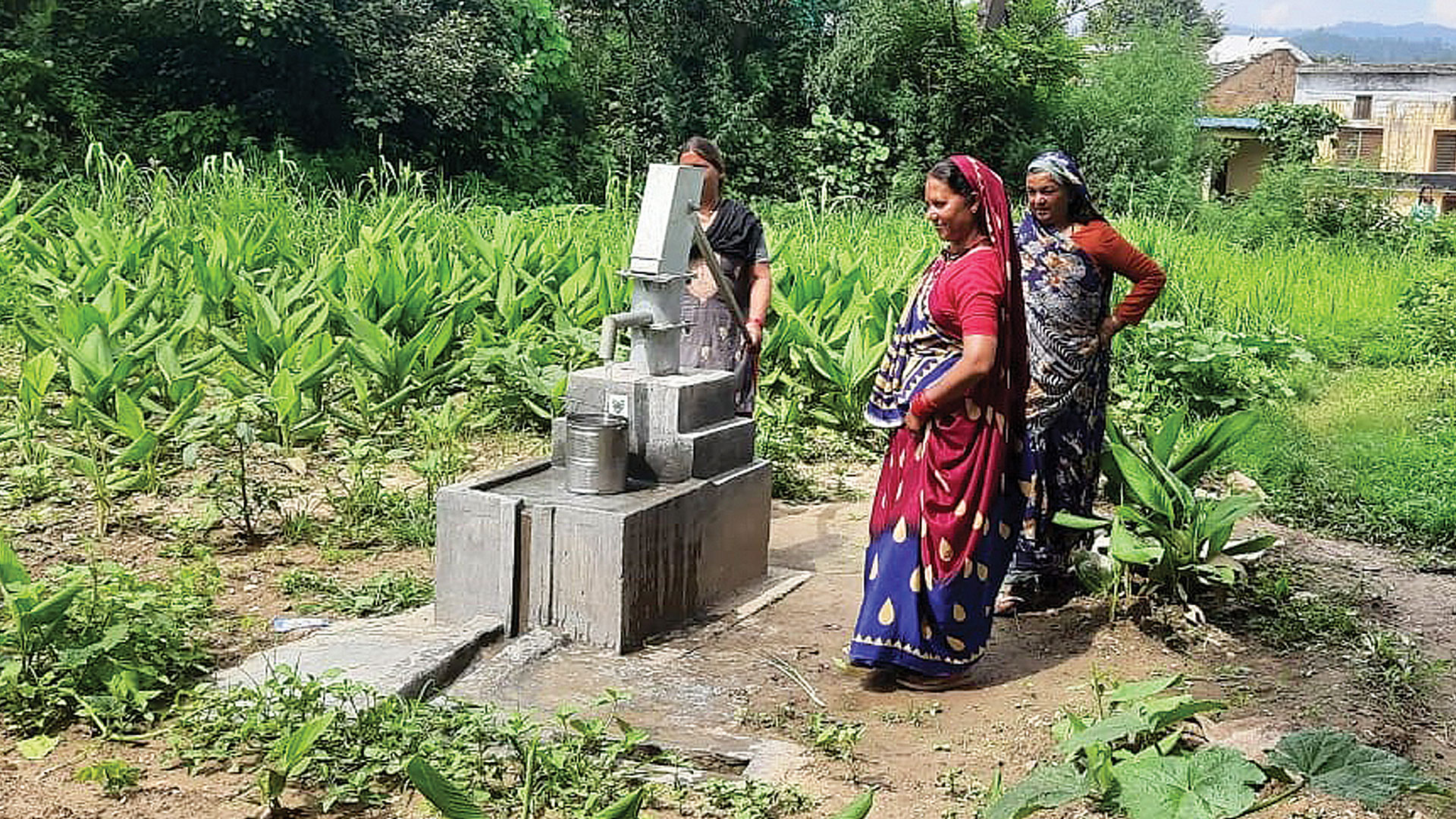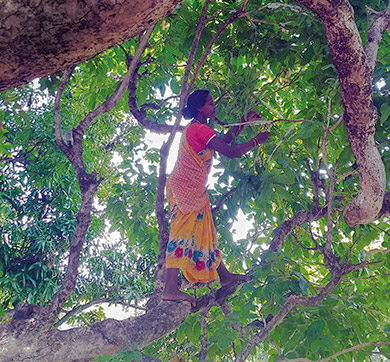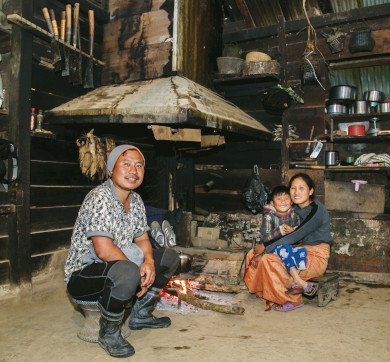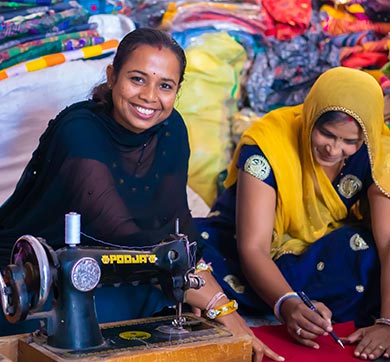September 2024 | 1871 words | 7-minute read
As the sound of the monsoon rain pelting down upon his roof reaches a deafening crescendo, Keshubha Udhabha Jagtiya, 49, a farmer from Mulvel village in Gujarat, is once again gripped by an all-consuming fear. Gazing at his crop of jowar and groundnut, he sees a terrifyingly familiar sight — streams of water meandering unhindered through his 11 acres of fertile land.
Determined to take matters into his own hands, he approaches the Gram Panchayat office with a request for the creation of a farm pond on his land for irrigation. Enter Tata Chemicals Society for Rural Development and its flagship intervention, Jal Dhan — a rainwater harvesting and watershed development programme — providing technical and resource support to create a 1,05,940 ft³ pond on his farmland.
His woes at an end, Mr Jagtiya can begin to reap the benefits — a 55% increase in crop produce, a profit of Rs 2 lakh+, enhanced soil fertility and additional water capacity.
One of the key reasons Tata Chemicals started the Jal Dhan programme in 1984 was because its plant in Mithapur, Gujarat, was in an arid zone and received low rainfall. “Our primary focus was developing rainwater harvesting structures by strengthening, deepening and creating community ponds and individual farm ponds to store rainwater,” says Alok Chandra, Chief - Health Safety and Environment and Corporate Social Responsibility (CSR), Tata Chemicals. “We carried out watershed interventions, identifying specific geographies where it was possible to restrain and retain water through the creation of a farm bund, which is a wall constructed along the boundary of an agricultural field, or a check dam, which is a temporary structure built to harness water along the channel of the flow.”
Ensuring water security
“Groundwater is an invisible resource; it supplies nearly 80% of India’s drinking water and two-thirds of the water used for irrigation,” says Sridhar Sarathy, Chief Ethics Officer and Head – Sustainability and CSR, Tata Capital. “Nearly 60% of Indian districts face groundwater over-exploitation. Recognising the urgency, we developed a community-led programme, keeping three areas of focus in mind — enhancing water percolation, improving water use efficiency, and positively making an impact on the income levels of the community.”
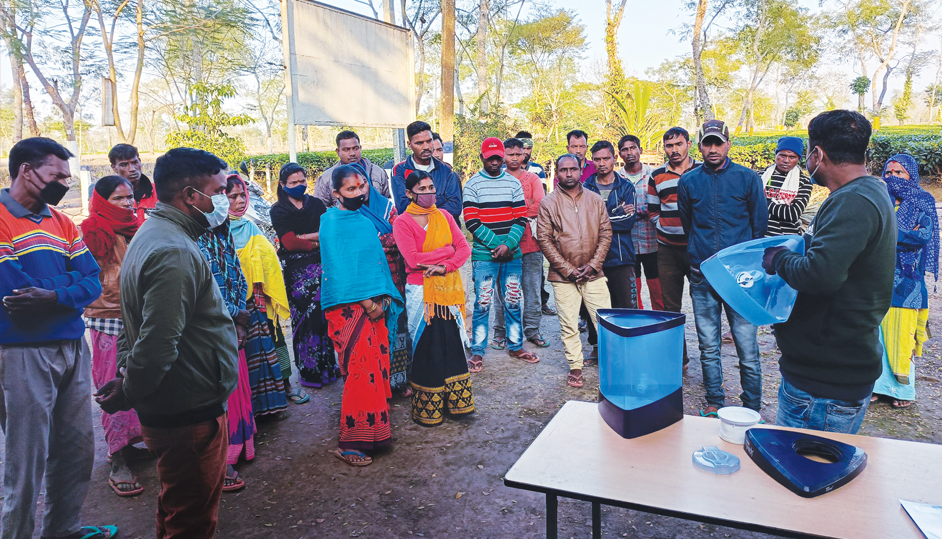
Impact
Himachal Pradesh
- 7,540 beneficiaries
- 4,278m³ of surface storage created
Assam
- 1.28 lakh m³ of surface runoff stored Assam
- Iron and fluoride removal plants installed in 9 locations
- 3,000+ households benefitted
*Impact till March 2024
In 2016, the company launched JalAadhar, a water security programme in Maharashtra to address man-made and climate change-induced ground and surface water scarcity. The programme operates through three models: an Integrated Watershed Development model for holistic water management through recharge, rejuvenation and efficient water usage; a Water Rejuvenation model to improve surface water availability through desiltation of water bodies and a Water Access model to increase accessibility through the installation of solar pumps and overhead water tanks. Due to its success, JalAadhar was expanded to Tamil Nadu and Rajasthan, and in FY23-24 alone, it reached
2 lakh+ people in 124 villages.
Championing water stewardship
For Tata Consumer Products (TCP), sustainability is embedded in its business strategy and operations, particularly in its commitment to water use efficiency and achieving water neutrality. “We are deeply aware of the critical position water holds as a natural resource and take it as a profound duty to steward the resources we draw upon, ensuring that our practices contribute positively to the environment and the communities we serve,” says Tarun Varma, Global Chief Human Resource and Sustainability Officer, TCP.
Through Project Jalodari — the flagship water management programme launched in 2021 in partnership with Tata Trusts and other associate organisations — TCP has implemented a holistic water management strategy. This includes conserving and recharging water sources, implementing springshed management initiatives, and providing safe drinking water by installing iron and fluoride removal plants.
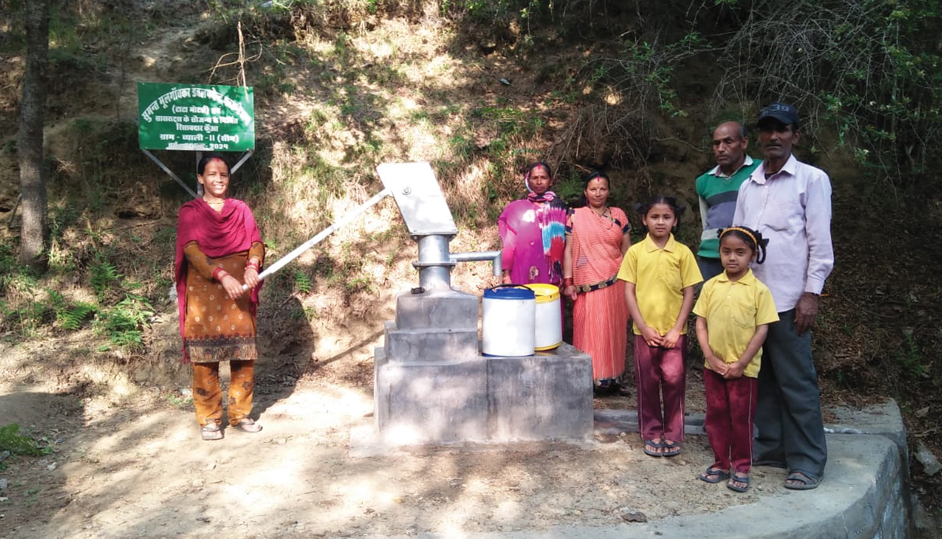
Impact
- 8.8+ lakh lives impacted through 1,000+ water projects
- Reached over 1,000 villages
- ~900 crore litres of water capacity created in the last 2 years
The programme not only ensures access to water, it also advocates more efficient water usage practices, and raises awareness about water security through a multi-stakeholder approach. Suphal Karmakar, a resident of Teok Tea Estate, says, “With a family of 11, fetching water was a daily struggle. The Iron Removal Plant has been a blessing, providing us with an abundance of clean water for our daily needs and community celebrations.” The programme operates in Paonta Sahib, in Himachal Pradesh, and Jorhat and Golaghat districts of Assam.
A Himalayan task
In 2001, Tata Trusts initiated Himmotthan Pariyojana (HMP) to address the root causes of underdevelopment in Uttarakhand. Himmotthan, the associate organisation that manages HMP, has been working among rural mountain communities since 2007, developing sustainable community-owned enterprises linked to livestock, agriculture and non-timber forest produce, and intervening for better education, access to safe water, sanitation and energy.
It has initiated numerous spring-fed, gravity flow community Water Supply and Sanitation (WaSH) projects in the area since 2002. Different recharge measures such as staggered contour trenches, recharge pits and loose boulder check dams constructed for springshed management have prevented both soil and water runoff, increasing the rate of infiltration of water and enhancing water discharge from springs. In 2013, after the devastating Uttarakhand floods, Titan joined forces with Himmotthan and initiated a comprehensive springshed management plan to rejuvenate dried springs, and construct trenches and percolation tanks across villages in the Tehri Garhwal District.
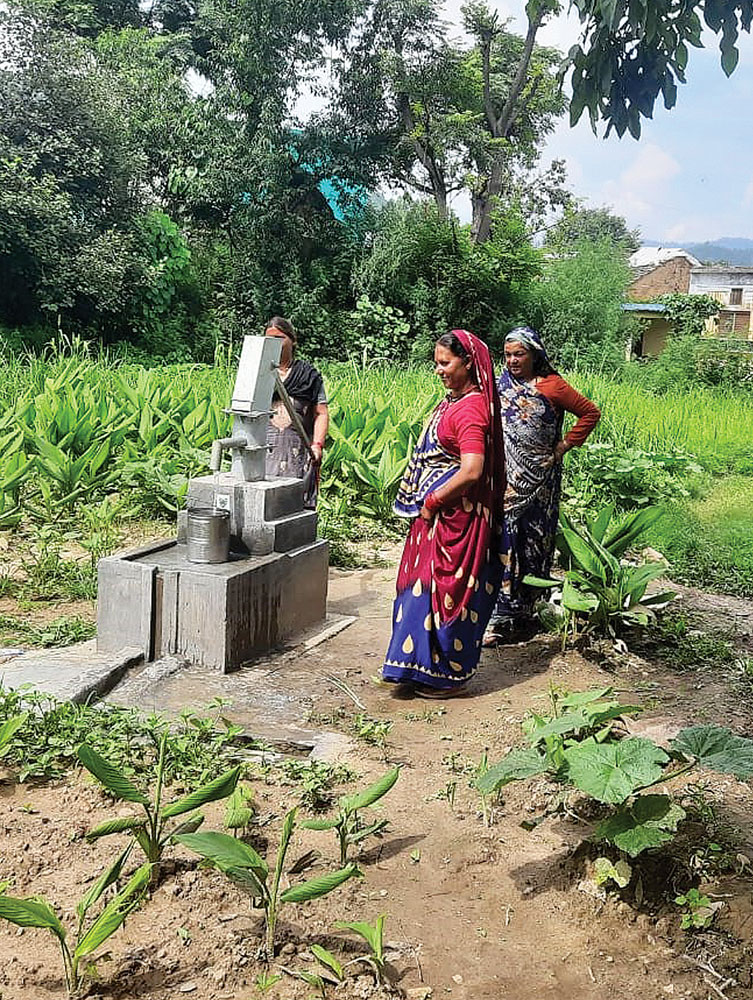
Enabling water access
According to NITI Aayog, the central government’s public policy think tank, 40% of India’s population will have no access to drinking water by 2030, and the country will lose 6% of its GDP by 2050 owing to this crisis. Given the pressing need to address this issue, Tata Trusts launched the Tata Water Mission (TWM) in 2014. It aims to create a healthy future for millions of Indians by providing safe, assured and adequate drinking water, along with improved sanitation and hygiene facilities through WaSH. Tata Trusts is ideating, implementing, upscaling and advocating a ‘One Water’ concept through a holistic water value chain approach to ensure that India’s vulnerable communities become self-reliant for their drinking, domestic, irrigation and ecology-related water needs.
Under the centre’s Jal Jeevan Mission (JJM), which promises to provide safe, assured and adequate drinking water to all rural households by 2024, Tata Trusts is collaborating with the governments of Gujarat, Uttarakhand, Himachal Pradesh, Ladakh, Maharashtra, Karnataka, Jharkhand, Andhra Pradesh, Uttar Pradesh, Assam, Tripura, Punjab, Mizoram and Nagaland to implement community-centric safe drinking water programmes. It has piloted the Internet of Things (IoT) in its smart water management system by deploying sensor-based tools that provide information about the quantity of water supplied to each household, and data on quality parameters such as residual chlorine, groundwater table, etc, on a real-time basis. This has reduced distribution issues like outages, leakages and low pressure, and increased awareness of water efficiency among villagers.
From scarcity to abundance
“Prior to 2019, there was a water shortage in my village and we were totally dependent on water tankers for daily needs,” says Sumitra Sole, Sarpanch from Dongarpada, a tribal hamlet in the Palghar district of Maharashtra. “During March and April, when water scarcity was at its peak, women were compelled to walk 6-7km to fetch water. This affected their health, deprived them of their daily wages and girls missed school.”
Moved by their plight, Tata Motors swung into action through its NGO, Sumant Moolgaokar Development Foundation (SMDF), leveraging Amrutdhara, its national drinking water programme for water-scarce villages. The projects are designed to address water availability, accessibility (structures are built close to hamlets) and absorbability (creating sustainable water systems operable by locals). Under the Amrutdhara programme, SMDF built wells and borewells, and installed RO plants where the water contained arsenic.
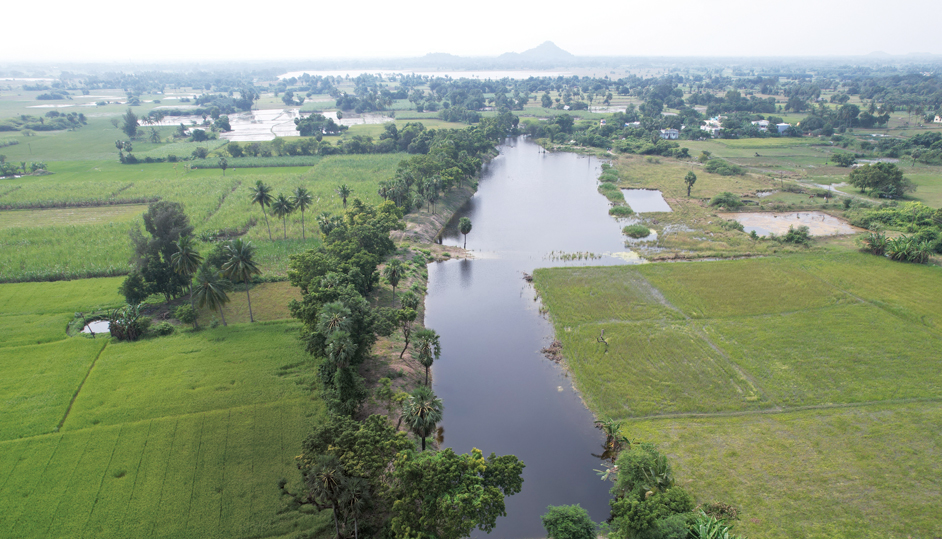
Impact
- Reached 3.3 lakh beneficiaries across 168 villages till date
- Created 20,500 lakh+ litre of water harvesting capacity
- Improved groundwater levels up to an average of 5m
“In 2018, we initiated the Integrated Village Development Programme in Palghar,” says Vinod Kulkarni, Head of CSR, Tata Motors. “As our first intervention, we created a large community farm pond with a capacity of 1.5 crore litre in Dongarpada. Later, we partnered with the state government and NAAM Foundation and rejuvenated and developed 106 water bodies across water-scarce villages of Palghar, Pune and Satara districts under the Amrit Sarovar Mission of the Government of India, ensuring around 186 crore litre of water capacity.”
A water-stressed nation
According to The United Nations World Water Development Report 2023, around 80% of people living under water stress live in Asia; in particular, north-east China, India and Pakistan. The global urban population facing water scarcity is projected to increase from 933 million (one third of the global urban population) in 2016 to 1.7–2.4 billion people (one third to nearly half of the global urban population) in 2050, with India projected to be the most severely affected.
Inspired by the impact created, the state government invited Tata Motors and NAAM Foundation in 2024 to rejuvenate 356 water bodies across 10 water-stressed districts as part of Gaal Mukt Dharan Gaal Yukt Shivar — a community-based desiltation programme to increase water capacity in old dams and water bodies.
For Ms Sole, with an increase in the water table, access to clean drinking water isn’t an issue anymore. This has had a positive impact on the overall health and quality of life in the community, especially for the women. Therein lies the true measure of the success of this and countless other programmes spearheaded by several Tata companies to combat India’s dire water crisis. By taking small but decisive measures, they are one step closer to making access to water and water security a reality for all.
- Sharmistha Choudhury




